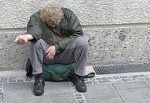 Woman Charged $600 Per Day For Distributing Food To Homeless In Philadelphia, Continuing National Crackdown On Homeless
Woman Charged $600 Per Day For Distributing Food To Homeless In Philadelphia, Continuing National Crackdown On Homeless
Rather than addressing the problem head on through aggressive policy, a growing number of cities are passing legislation to criminalize homelessness rather than working to solve it.
Angela Prattis, a Philadelphia resident, is now facing a $600 per day fine for distributing food to homeless people in public parks. Around 30 cities across the U.S. have enacted similar bans on food distribution in addition to a range of other punitive laws designed to restrict aid to homeless populations.
Tracking and delivering aid to homeless populations has always been a challenge for city and state authorities. The number of homeless has grown in recent years, commensurate with declines in the economy and increases in substance abuse nationwide.
During the summers, Prattis turns her driveway into an outdoor food kitchen, providing meals to 60 people, mostly children desperately in need of a food. Her program isfunded by the State Department ofEducation and is administered by the archdiocese of Philadelphia.
However, the 41-year-old mother was informed this week that she would need to purchase a $1,000 special zoning permitin order to continue feeding homeless people in her community. Officials also vowed to fine her $600 per day for the days she did not have the permit
Prattis has long operated this charitable program in her community without incident until a new city law was introduced March banning the distribution of food in public spaces.
Philadelphia Mayor Michael Nutter announced the new legislation prohibiting the distribution of food to homeless people in public spaces, receiving a mostly negative public response. While the law has come under intense scrutiny, Nutter believes that the law will help ensure that homeless people have dignity saying in a recent press conference:
“I believe that people, regardless of their station in life, should be able to actually sit down, at a table, to a meal inside, away from the heat and the cold, the rain and the snow, the vehicle exhaust and all the other distractions of everyday city life.”
However, Philadelphia officials while attempting to restore dignity to food distribution have not taken the proper steps to open new shelters and increase the scope of public programs serving the homeless population.
Those working for non-profit organizations serving the homeless, including Angela Prattis, have been mostly critical of laws limiting their ability to help the most vulnerable people in U.S. society.
Neil Donovan, the director of theNational Coalition for the Homelesscommented on the new legislation in a July National Public Radio (NPR) interview saying:
“We do feel that communities are really, really frustrated with repeated efforts to end homelessness that have been quite unsuccessful. But we push back and say, you know, that doesn’t mean that you simply throw your hands in the air and make criminals out of homeless people.”
There is also a growing number of laws targeting the homeless by cracking down on loitering, panhandling and camping, all non-violent crimes.
These laws don’t just marginalize the homeless, they really takes the focus off of solutions and puts it much more on restrictions,” Donovan added.
Although there have been a number of laws restricting food distribution, other states have enacted legislation aimed at helping the homeless.
In June, Rhode Island became the first U.S. state to pass a, Homeless Bill of Rights. The Bill won broad bipartisan support in the State Senate and was supported by Rhode Island Gov. Lincoln Chafee.
Tags: Criminalization, Homelessness, Hunger, Philadelphia
